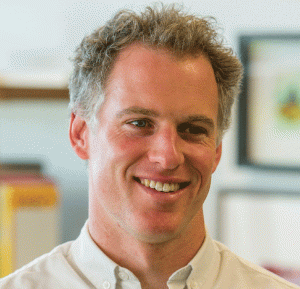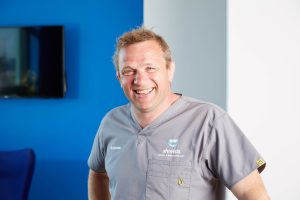Achieving exponential practice growth
by Zac Fine
 Zac Fine speaks to Cormac Shields about growing Shields Dental and Implant Clinic’s revenue from €800k to €5m in less than five years
Zac Fine speaks to Cormac Shields about growing Shields Dental and Implant Clinic’s revenue from €800k to €5m in less than five years
Cormac Shields and his twin brother Conor took their practice from €800k to more than €3m in four years. Now, having established scalable business processes, they are acquiring further practices beyond Shields Dental & Implant Clinic in Limerick to establish a group. So far, they have purchased a practice and a mouthguard laboratory in Roscrea, bringing turnover up to €5m.
I caught up with Cormac to ask him about the journey so far.
What’s been your greatest personal challenge?
I’m 48 and, having been a dentist for so long, my thinking became specialised and everything else took a back seat. I didn’t have a clue what a managing director – the role I have taken – did. It’s only when you’re battle hardened that you discover what it involves.
It was extremely difficult. I didn’t know the pitfalls, I didn’t have experience, I felt hugely exposed, ineffective and quite vulnerable. I now know after four years how to do it, but it was daunting reducing my clinical work – the thing I’m highly trained and competent at – and picking up something that I’m not trained to do.
How did you know that was what you had to do?
A friend of ours sold his practice and said: ‘I’m earning twice as much as an associate than I was as the owner.’ That meant he had been subsidising the business for 40 years, but we had no business acumen and made the same mistake.
We moved to Limerick, picked a great location, borrowed €1m, and we knew how to do high-end private work. After a while, revenue plateaued but there was nothing left after tax. I knew we needed help because we were at maximum slog. I thought: ‘If we don’t do this now I’m going to be complaining for another 30 years.’
What was business model before you grew the business?
The main dentists were myself, Conor and another dentist. Outside of that circle, I couldn’t think of anyone else making the money, and I assumed that if I reduced my clinical hours then the practice would lose money.
I never had the mindset that my team could make money without myself and Conor generating the big fees. But I realised we needed help to change something, so we brought Fine Company in. My brother thought €1,500 was a lot for one day per month, but we said we’d give it six months.
What happened?
Jonathan Fine recommended a few simple changes to start. One was raising prices. He predicted a 30% growth in revenue and there it was in a few months. He said me and Conor were making the business stagnant by earning most of the fees, that it was all about ‘come to see the twins’ rather than running the business well.
We realised we didn’t have a clue how to run a business. We both went on the Fine Company leadership course – and it was emotional! Suddenly, you had to tell your story and be honest about what you’re doing it all for. It was a mature way of resetting my values.
My perception had been that being a leader was about being tough and sometimes being a dictator, and I was OK with that, but this was the other way around, it was about being humble and leading by example.
I had things to say to Conor about what I thought was making us weak and he had things to say to me. It enabled more honest communication and we saw we were sometimes running in different directions.
We’d try to meet to discuss the business but we’d be too tired, and we weren’t working well together as leaders. After the course, we got more organised, with regular meetings, running the business as a process rather than with emotion.
How has the business changed?
It’s moved to a different level, which requires a different approach and a larger management team.
The main practice is on the South Circular Road in Limerick and is open seven days a week. We’ve just opened a second practice five miles away in Castleroy in a retail location with high footfall, and we are acquiring a practice with a lab outside Limerick.
We’re aiming to have nine or 10 scattered within an hour of the main practice within five years in a hub and spoke model. Our clinical team is centrally managed so our dentists can work when they are needed at the smaller practices, adding value and creating group cohesion.
 How has your life changed?
How has your life changed?
It’s a lot more stressful but I’m playing the long game. It’s about my exit. I don’t want to be sitting here trapped at 55, I want it to be a choice.
We knew we had some tough years ahead of us and that it would be different from working hard on dentistry, which doesn’t come with a huge amount of stress. It’s also exciting; I feel the adrenaline pumping, especially on the bad days.
I went down to four days clinical, then back up to five to open our second clinic because we didn’t have enough clinicians at first. That was hard. I’ll be down to three days soon and that’s the first time that we’ll be taking our hands off the wheel clinically and letting other dentists take over.
How do you feel compared to four years ago?
More anxious, so it’s about learning how to cope with the stress of it.
My father, who was a dentist, says he doesn’t know how we run more than one clinic but I tell him it’s like having kids, once you’re doing it it’s just about how you deal with it. Two or three years ago we could have sold our practice for €2m or €3m but we decided we wanted a legacy, a good business.
I could write a book on the mistakes we’ve made and the subconscious battering I’ve taken, but that mental strain is how you develop and become smarter. I see things now that I couldn’t see before. It’s obvious to people who have business experience, but for me it’s been slow steps.
Now, going from one practice to 10 doesn’t horrify me, I know it’s about process and scalability, just like having a bigger family.
What scares you?
The margins of error. Before there were no cashflow problems and if we needed €10k or €15k it was there. Now it’s bigger grosses but the mistakes can be bigger, not €10k but €300k, and that’s frightening. But mistakes do happen. So I need a really good business team behind me to keep them to a minimum.
Have you struggled with delegating?

I didn’t mind it because I knew my skill set was dentistry, not business, so I’ve had to trust people with more experience at business.
Having said that, we’ve had two business managers who we had to get rid of and they left behind destruction. That was a learning curve. We’ve taken on another one but this time I know what I’m doing. That was the most stressful part, upgrading the structure of the business, but I had trust in Jonathan, who had been with us for three years by then.
The first two business managers were being paid €60k and they were from big companies, but they were taking us for a ride. We’ve had to increase the salary to €80k to get someone who is up to a different standard. I’m happy expanding if I have the right business team behind me, and I feel we’re 70% there. We can start to let go as owners when the team is 100% there.
What would you have done differently?
I’d have done this earlier, perhaps in my early 40s. If I was doing it in my mid-30s I’d probably have a lot more energy but I wouldn’t be as skilled as a dentist.
I enjoy dentistry but it wouldn’t take me long to get used to not doing it. Giving it up would be frightening in a sense because it’s who I thought I was, but long term the slog of clinical dentistry takes its toll. I’ve done enough of it, I’d like to make my living from the business of dentistry now.
I’ve seen friends of mine from business-orientated families do really well, and I’d like my children to understand the business world. Education is important but the business world opens doors for you too, and there are great opportunities at the moment for dentists.
I think Ireland is an unbelievable place to work. It’s all private dentistry, the fees are good and you get a huge amount of respect. People are used to paying and they expect quality.
I worked in the NHS in England for five years and realised I couldn’t do it anymore, so it’s been great creating the facilities and environment that support good dentistry here.
Most of my dentists are foreigners who are highly skilled and want to do brilliant dentistry. So I feel lucky to be where we are and I think Ireland is a wonderful place to be a dentist.
 Zac Fine is content director at www.finecompany.com, a full service dental consultancy working with leading Irish practices. For more information, email zac.fine@finecompany.com.
Zac Fine is content director at www.finecompany.com, a full service dental consultancy working with leading Irish practices. For more information, email zac.fine@finecompany.com.
 Cormac Shields is a dental surgeon at Shields Dental & Implant Clinic in Limerick, which he set up with his brother Conor in 2005. For further details, visit www.shieldsdentalclinic.ie.
Cormac Shields is a dental surgeon at Shields Dental & Implant Clinic in Limerick, which he set up with his brother Conor in 2005. For further details, visit www.shieldsdentalclinic.ie.
This article was first published in the October 2019 issue of Irish Dentistry. Read more articles like this with a magazine subscription. Click here to subscribe or call 01923 851 777. Get in touch via Twitter @IrishDentistry or Facebook.com/IrishDentistry.

